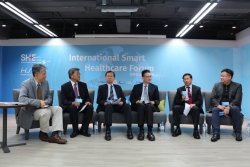Taiwan’s hospitals are now taking aggressive action to carry out its smart applications combining 5G and AI technology. For example, Tri-Service General Hospital(TSGH) is building up a series of surgery training sessions and telehealth instruction for its branch hospital on outlying islands, using technologies combining mixed reality (MR), augmented reality (AR) glasses, and virtual reality (VR). On the other hand, Mackay Memorial Hospital launched a set of mobile mammography buses, which could transmit real-time images back to the hospital, run AI analysis on cloud, and if necessary, it could help make clinical appointments, providing healthcare service for people in remote areas. Programs alike to apply the latest technologies are expected to vastly upgrade the medical service quality in Taiwan.
In this case, on Jun. 3rd, Taipei Computer Association (TCA) held the first side event on Smart City Online: the international smart healthcare forum session titled “AI x 5G: Transformation in Healthcare”. The session was co-hosted by Joint Commission in Taiwan, and TCA, while speakers included Dr. Da-Chen Chu, the deputy superintendent of Taipei City Hospital, Dr. Po-Sheng Yang, Chair of Center of Biomedical Development, Mackay Memorial Hospital, Dr. Chia-Cheng Lee, CEO of Medical Artificial Intelligence and Internet of Things Development Center of TSGH, Dr. Wayne Huey-HerngSheu, Superintendent of Taichung Veterans General Hospital, Dr. Kuen-Rong Lo, Director of Data Communications Business Group, Chunghwa Telecom, and Dr. Ted Chang, CTO of Quanta Computer. The panel discussion was hosted by Dr. Pa-Chun Wang, CEO of the Joint Commission of Taiwan.
Dr. Chia-Cheng Lee pointed out that 5G technology features in its low latency, broad bandwidth, and capability to connect large number of end-devices, altogether forming brand new outlook for smart healthcare. TSGH has been incorporating the medical resources among its domestic branches in recent years. Working with Industrial Technology Research Institute, the Hospital launched a smart surgery room with 5G technologies in smart glasses, AR and VR to pass on senior surgeons’ know-how in surgical fields. In case of emergency, training sessions on telehealth could be promptly conducted with an aim to extend high-quality medical care to patients even on outlying islands. Dr. Lee also stressed that with the 5G applications in smart healthcare being popularized, the TSGH plans to organize a 5G network among the branches for more effective communication based on the concerns in data and privacy information security.
Dr. Po-Sheng Yang also claimed that in the 5G era, a smart surgery room is certainly one of the first applications to be introduced. In Mackay Memorial Hospital, they began the experiments on AI and 5G integration with the mobile buses of breast cancer screening. All screening results are sent back to the hospital’s cloud system immediately to run the AI diagnosis. If a potential symptom is found, it will promptly send a notification to the buses and help with appointments right away, which fully shows its advantages as cutting-edge technology.
Dr. Kuen-Rong Lo said Chunghwa Telecom just supported the Yuan Rung Hospital in Changhua with its 5G telehealth program on smart glasses. During the COVID-19 pandemic, the SOP set up by the central authority of healthcare suggested that doctors should not enter high-risk areas such as long-term care centers. Therefore, registered nurses with smart glasses can send real-time images from clinical visits back to the hospital for physicians to observe the conditions, while such method applies to home care as well.
Dr. Da-Chen Chu revealed in the forum’s opening remark that Taiwan’s extraordinary performance in its pandemic prevention corresponds to our technological applications in containing the spread of virus. For example, the phone tracking system for home-isolated individuals, crowd scaling by detecting mobile signals, and analysis on contact history, all depend on the related IoT technologies. Effective measures include the mask selling machine (with rationing), which was presented by Taipei City’s Department of Health, to notably cut down the time cost for people to purchase masks. He expected that the pandemic will bring in more resources and applications in smart healthcare.
(Left) Before the forum session, Dr. Pa-Chun Wang, CEO of Joint Commission of Taiwan, took a photo with Dr. Da-Chen Chu, the deputy superintendent of Taipei City Hospital.
(From left)Dr. Pa-Chun Wang, CEO of Joint Commission of Taiwan, Dr. Po-Sheng Yang, Chair of Center of Biomedical Development, Mackay Memorial Hospital, Dr. Wayne Huey-HerngSheu, Superintendent of Taichung Veterans General Hospital, Dr. Chia-Cheng Lee, CEO of Medical Artificial Intelligence and Internet of Things Development Center of TSGH, Dr. Kuen-Rong Lo, Director of Data Communications Business Group, Chunghwa Telecom, and Dr. Ted Chang, CTO of Quanta Computer (during the panel discussion)
